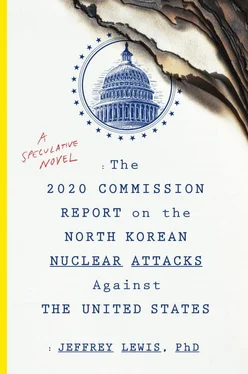Jeffrey Lewis - The 2020 Commission Report on the North Korean Nuclear Attacks Against the United States
Здесь есть возможность читать онлайн «Jeffrey Lewis - The 2020 Commission Report on the North Korean Nuclear Attacks Against the United States» весь текст электронной книги совершенно бесплатно (целиком полную версию без сокращений). В некоторых случаях можно слушать аудио, скачать через торрент в формате fb2 и присутствует краткое содержание. Город: New York, Год выпуска: 2018, ISBN: 2018, Издательство: Mariner Books, Жанр: Фантастика и фэнтези, Триллер, на английском языке. Описание произведения, (предисловие) а так же отзывы посетителей доступны на портале библиотеки ЛибКат.
- Название:The 2020 Commission Report on the North Korean Nuclear Attacks Against the United States
- Автор:
- Издательство:Mariner Books
- Жанр:
- Год:2018
- Город:New York
- ISBN:9-781-328-57391-9
- Рейтинг книги:4 / 5. Голосов: 1
-
Избранное:Добавить в избранное
- Отзывы:
-
Ваша оценка:
- 80
- 1
- 2
- 3
- 4
- 5
The 2020 Commission Report on the North Korean Nuclear Attacks Against the United States: краткое содержание, описание и аннотация
Предлагаем к чтению аннотацию, описание, краткое содержание или предисловие (зависит от того, что написал сам автор книги «The 2020 Commission Report on the North Korean Nuclear Attacks Against the United States»). Если вы не нашли необходимую информацию о книге — напишите в комментариях, мы постараемся отыскать её.
The 2020 Commission Report on the North Korean Nuclear Attacks Against the United States — читать онлайн бесплатно полную книгу (весь текст) целиком
Ниже представлен текст книги, разбитый по страницам. Система сохранения места последней прочитанной страницы, позволяет с удобством читать онлайн бесплатно книгу «The 2020 Commission Report on the North Korean Nuclear Attacks Against the United States», без необходимости каждый раз заново искать на чём Вы остановились. Поставьте закладку, и сможете в любой момент перейти на страницу, на которой закончили чтение.
Интервал:
Закладка:
“ In the end… the best one can say is that some mobile launchers may have been destroyed”: This sentence is from an official post–1991 Gulf War assessment cited earlier also asks: “How effective were such efforts? It is hard to say in a tactical sense; the evidence of how many mobile Scuds and their launchers Coalition air attacks destroyed or damaged remains spotty. It does appear that a number of tanker trucks on the way to Jordan or Basra paid a severe price for having infrared signatures resembling mobile launchers; some Bedouins also may have paid a similar price for having elongated, heated tents in the desert blackness that looked like canvas-draped Scuds. In the end, the best one can say is that some mobile launchers may have been destroyed. Although Iraqi launch rates of modified Scuds—particularly of coordinated salvos—dropped over the course of the campaign, and while mobile Scud operations were subjected to increasing pressures and disruption, most (and possibly all) of the roughly 100 mobile launchers reported destroyed by Coalition aircraft and special operation forces now appear to have been either decoys, other vehicles[, or] objects unfortunate enough to provide Scud-like signatures” (emphasis added). Thomas A. Kearney and Eliot A. Cohen, Gulf War Air Power Survey: Operations Effects and Effectiveness, vol. 2 (Washington, DC: US Government Printing Office, 1993), 189.
“Those guys were like cockroaches”: Tom McIntyre, as quoted in William L. Smallwood, Strike Eagle: Flying the F-15E in the Gulf War (Sterling, VA: Brassey’s, 1997), 138.
“It’s a huge flame and your first reaction is that it’s a SAM”: McIntyre, as quoted in Smallwood, Strike Eagle, 138.
9. Wheels Up
For the invasion of Iraq, the Navy moved more than 56 million square feet of cargo: The statistics and comparison are to be found in D. L. Brewer III, “Operation Iraqi Freedom—Clearing the Hurdles,” SEALIFT, June 2004.
North Korea was targeting Texas because of its excellent business climate: Katie Glueck, “Perry on Why N. Korea Targets Texas,” Politico, April 3, 2013.
We did tests, the foundation is anchored into the coral reef: Donald Trump, as quoted in Tom Junod, “Trump,” Esquire, January 29, 2007.
“There’s no big red button to put that [interceptor] in play”: Colonel Kevin Kick, as quoted in “Inside the Gates: Alaska’s 49th Missile Battalion,” KTVA, January 18, 2018.
The panel proposed replacing the system in Alaska entirely, calling the defense it offered “fragile”: “The ground-based interceptors (GBIs), as part of the GMD system deployed at Fort Greely, Alaska (FGA), and Vandenberg Air Force Base, California (VAFB), evolved to their current configuration through a series of decisions and constraints. They provide an early, but fragile, US homeland defense capability in response primarily to a potential North Korean threat.” Committee on an Assessment of Concepts and Systems for US Boost-Phase Missile Defense in Comparison to Other Alternatives, Making Sense of Ballistic Missile Defense: An Assessment of Concepts and Systems for US Boost-Phase Missile Defense in Comparison to Other Alternatives (Washington, DC: National Academies Press, 2012), 130–131.
mocking the “hobby shop” approach of the people who built it: “MDA’s [Missile Defense Agency] efforts have spawned an almost ‘hobby shop’ approach, with many false starts on poorly analyzed concepts. For example, analysis of successful programs with missiles of comparable complexity—that is, with the comparison costs at a similar point of development maturity and at 2010 dollars—suggests that the current GMD interceptors are approximately 30 to 50 percent more expensive than they should be at this point in the program.” Committee on an Assessment of Concepts and Systems, Making Sense of Ballistic Missile Defense, 11.
In nearly twenty years of testing, the system had worked only nine out of eighteen times: Sydney Freedberg, “GMD Missile Defense Hits ICBM Target, Finally,” Breaking Defense, May 30, 2017.
“It’s stupid”: David Willman, “Trump Administration Moves to Boost Homeland Missile Defense System Despite Multiple Flaws,” Los Angeles Times, December 24, 2017.
But tests were expensive, costing nearly $300 million each: George Lewis, “How Much Do GMD Tests Cost?” Mostly Missile Defense, December 28, 2012.
One document plainly admitted that the “deterrence value” of the system was “decreased by unsuccessful flights”: US Department of Defense, Missile Defense Agency, Final Report of the Missile Defense Agency’s Independent Review Team (IRT), 2005.
“It assumes that the failure modes of the interceptors are independent of one another”: James Acton, as quoted in Kessler, “Trump’s Claim That a US Interceptor Can Knock out ICBMs ‘97 Percent of the Time.’”
“If there’s a foreign object in one unit, it’s sort of whistling past the graveyard”: David Willman, “There’s a Flaw in the Homeland Missile Defense System. The Pentagon Sees No Need to Fix It,” Los Angeles Times, February 26, 2017.
“give us a limited capability to deal with a relatively small number of incoming ballistic missiles”: The quote is from actual secretary of defense Donald Rumsfeld during a December 17, 2002, briefing at the Department of Defense.
“The method used by the Army to assess warhead kills”: This quote is a passage from actual testimony by Steven Hildreth, a researcher at the Congressional Research Service, who independently reviewed the data provided by the Army on the performance of the Patriot missile defense system in the 1991 Gulf War. Congressional Research Service, “Evaluation of US Army Assessment of Patriot Antitactical Missile Effectiveness in the War against Iraq,” testimony prepared for the House Government Operations Subcommittee on Legislation and National Security, April 7, 1992.
“normally a protocol no-no”: Andrew Card, speaking about September 11, 2001, as quoted in Garrett M. Graff, “‘We’re the Only Plane in the Sky,’” Politico, September 9, 2016. Many of the following quotations about Air Force One, as cited, are in fact real recollections of real people from September 11, 2001. Notable as source material in this regard is Graff’s excellent oral history of the day, as published by Politico, as well as an account by Mark Tillman, the pilot of Air Force One that day, that appeared in Dennis Wagner, “On 9/11, Air Force One Pilot’s Only Concern Was President Bush’s Safety,” Arizona Republic, September 11, 2011.
“My boss… called and told me to depart as soon as the president got on board”: Tillman, as told to Wagner, “On 9/11, Air Force One Pilot’s Only Concern Was President Bush’s Safety.”
“They were drooling all [over] the luggage”: Sonya Ross, speaking about September 11, 2001, as quoted in Graff, “‘We’re the Only Plane in the Sky.’”
“It was a full-thrust departure… up like a rocket”: Tillman, as quoted in Wagner, “On 9/11, Air Force One Pilot’s Only Concern Was President Bush’s Safety.”
“We were climbing so high and so fast”: Ellen Eckert, speaking about September 11, 2001, as quoted in Graff, “‘We’re the Only Plane in the Sky.’”
10. Black Rain
Their voices can convey what our words cannot: The survivor stories are, in fact, accounts from the Hibukasha-Japanese people who survived the bombing of Hiroshima and Nagasaki in 1945. The translations have been lightly edited in this text. The testimonies presented in this chapter are largely drawn from interviews presented in the television program Hiroshima Witness, produced by the Hiroshima Peace Cultural Center and NHK, Japan’s national public broadcaster. These interviews were translated into English by the college students Yumi Kodama, Junko Kato, Junko Kawamoto, Masako Kubota, Chiharu Kimura, and Kumi Komatsu, who were advised by Laurence Wiig, and they are now posted at the Atomic Archive. Condensed versions are also available on the website of the Hiroshima Peace Memorial Museum: http://www.pcf.city.hiroshima.jp/.
Читать дальшеИнтервал:
Закладка:
Похожие книги на «The 2020 Commission Report on the North Korean Nuclear Attacks Against the United States»
Представляем Вашему вниманию похожие книги на «The 2020 Commission Report on the North Korean Nuclear Attacks Against the United States» списком для выбора. Мы отобрали схожую по названию и смыслу литературу в надежде предоставить читателям больше вариантов отыскать новые, интересные, ещё непрочитанные произведения.
Обсуждение, отзывы о книге «The 2020 Commission Report on the North Korean Nuclear Attacks Against the United States» и просто собственные мнения читателей. Оставьте ваши комментарии, напишите, что Вы думаете о произведении, его смысле или главных героях. Укажите что конкретно понравилось, а что нет, и почему Вы так считаете.












